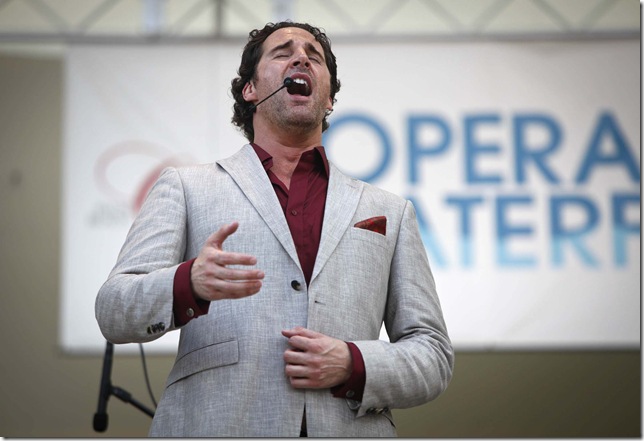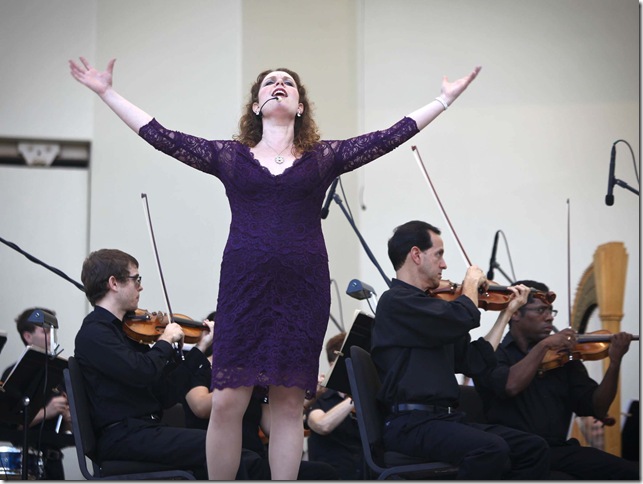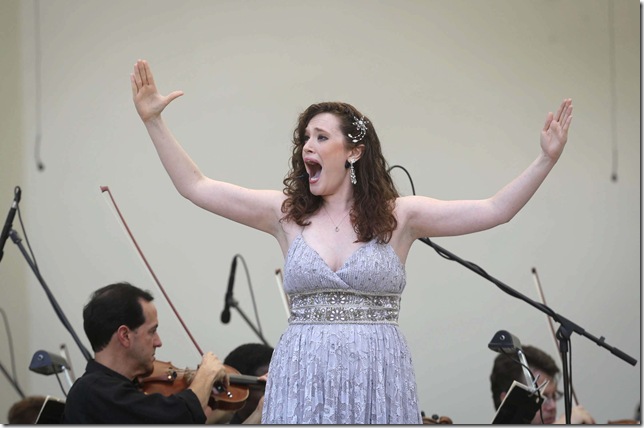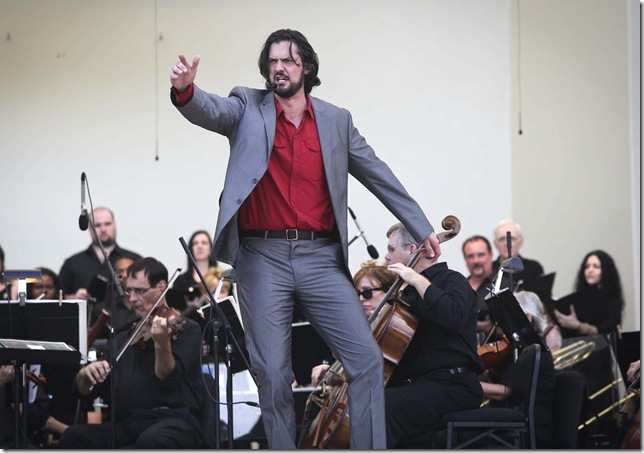The weather gods looked favorably upon Saturday’s festive gathering at the Meyer Amphitheatre on Flagler Drive. The sun shone behind clouds, and cool breezes from Lake Worth fanned across the gladed greenery.
Even better, the Palm Beach Opera’s 2013-14 group of seven Young Artists made a positive impression, breathing new life into old arias. Distinguished tenor James Valenti made a guest appearance, accompanied by the Palm Beach Opera Orchestra and Chorus, ably conducted by Greg Ritchey.
An audience estimated at 2,500 people was on hand for the free outdoor concert, the first offering of its kind in the opera company’s history. But already it will have a successor; General Director Daniel Biaggi announced that next year’s date — Dec. 13, 2014 — has been chosen, to a roar of approval from the crowd.
People arrived early for the 2 p.m. start, bringing folding chairs and blankets, with a variety of picnic baskets full of goodies. There was also a fine food concession stand serving a nice selection of warm and cold food dishes. Volunteers handed out the program printed on white cardboard paper for use as a fan, with a wooden handle — a useful novelty in case temperatures began to rise — and the date for next year’s concert printed on it.
Ritchey, the company’s chorus master, began with a crisp rendition of The Star-Spangled Banner — the best I’ve ever heard, his chorus taking a strong lead and sounding marvelous. Surely Francis Scott Key was cheering them on from the beyond, saying: This is how my anthem is supposed to be: Lusty, spirited and bold, not mangled and slow, like so many awful performances over the years. It augured well for what was to follow.
Verdi’s La Forza del Destino overture opened the concert proper, with sweet strings and a strong brass section providing excellent playing. Baritone Tobias Greenhalgh launched the singing with Rossini’s Largo al factotum, from The Barber of Seville (second of the company’s mainstage productions this year). He was in fine voice for this crowd pleaser.
Metropolitan Opera star Valenti gave a lovely performance of Bizet’s Flower Song (La fleur que tu m’avais jetée) from Carmen, getting into a little difficulty with the higher register at the end. Next came mezzo-soprano Rachel Arky, with the Habanera (L’amour est un oiseau rebelle), also from Carmen. Hers is a warm rich voice, verging on contralto, with amazing breath control.
Tenor Nicholas Nestorak, obviously feeling in good voice, switched from singing Donizetti’s Quanto e bella from L’Elisir d’Amore, to the same composer’s Pour mon âme, from La Fille du Régiment, with its redoubtable series of nine high C’s. Nestorak tossed off each one with ease, in a metallic, penetrating, highly placed delightful tenor.
Next, the chorus gave a lusty rendition of the so-called Anvil Chorus (Vedi! Le fosche notturne) from Verdi’s Il Trovatore. Their full-out sound at the end was magnificent. Valenti returned to the stage next. Now in full command of his substantial vocal powers, he attacked Quando le sere al placido from Verdi’s Luisa Miller and illuminated the text with a sensitive interpretation. It’s a difficult aria at the best of times, even when fully staged. As a solo piece he made it work, and he sounded sublime.
Bridgette Gan, a beautiful soprano, amused the crowd with the Doll Aria (Les oiseaux dans la charmille) from Offenbach’s The Tales of Hoffmann. Gan has an incredible flexibility of voice with an astonishing high range that would easily meet the demands of Mozart’s Queen of the Night. A Young Artist holdover from last season, the very fine bass-baritone Peter Tomaszewski, delivered Some Enchanted Evening from Richard Rodgers and Oscar Hammerstein II’s musical South Pacific, and charmed everyone with his relaxed approach and beautiful warm timbre (not unlike that of Ezio Pinza, the operatic bass who created the role).
Bernstein’s Candide overture caught the orchestra going through a couple of rough patches in the middle. The flute player’s solos had fine moments and the rushing melody was carried to an exciting finish, warmly applauded. Five young artists joined Valenti in the sextet (Chi mi frena in tal momento?) from Donizetti’s Lucia di Lammermoor, which was a brilliant piece of collaborative singing by all.
Gan and Arky were up next, making some heavenly music with the Flower Duet (Sous le dôme épais) from Delibes’ Lakmé. Tomaszewski returned as the toreador Escamillo from Carmen, singing of love (Votre toast) while surrounded by Gan, Arky and mezzo JoAna Rusche; he sang with passion, lots of savoir faire and conviction. A great aria, well-sung.
The Song to the Moon (Měsíčku na nebi hlubokém) from Dvořák’s Rusalka, followed, sung by soprano Claire Kuttler. She has a lovely voice, perfect pitch, a bell-like quality, but did not get enough passion into the piece. But tons of promise ahead for her.
Rusche sang Rossini’s Una voce poco fa from The Barber of Seville, a six-minute ride of tricky scales, difficult runs and terrific high notes for a mezzo soprano. Rusche met every challenge with a full-bodied rich tone, a wide range and the flexibility needed in this role.
Baritone Greenhalgh was back next with another Broadway selection, The Impossible Dream, from Mitch Leigh’s Man of La Mancha. Unfortunately, he had to fight the noise of a police siren on Flagler Drive as he sang the words, “To fight the unbeatable foe.” Greenhalgh filled his lungs, sang louder and tried to outdo the siren. For his brave effort, he was rewarded with a rave reception.
Valenti returned to sing Puccini’s E lucevan le stelle, from Tosca. As Cavaradossi awaits the firing squad, he sings of the starry night and his love for Tosca. The audience hung on every note from Valenti’s lovely voice. It was a magnificent performance of this gem of an aria, tenderly sung with passion and quiet, resigned emotion.
What better way to end the afternoon then with a drinking song, especially when it’s Libiamo, ne’liete calici, from Verdi’s La Traviata. Valenti and all seven Young Artists sang it heartily, and were met with a standing ovation; literally everyone in the park stood to cheer them, some of them even shouting for encores.
The public’s appetite has now been whetted for these wonderful young singers, who they’ll be able to hear in Macbeth, The Barber of Seville and The Tales of Hoffmann over the next three months. To my mind, they are head and shoulders better than any past Young Artists troupe at this company. All of them could easily slip into a major role at a moment’s notice.
Two quibbles: Concertgoers could follow operalivecue.com on their mobile devices to learn more about the singers. But couldn’t this also be adapted to run translations of what the singers were singing about (sort of like having your own supertitles)? Also, the brass section often drowned out the rest of the orchestra. It’s not their fault; the overhanging stage canopy picks up their vibrations and pushes them forward, to the detriment of a balanced orchestral sound at times.
But let’s not be churlish: It was a great afternoon of singing.
Rex Hearn founded the Berkshire Opera Company and regularly covers classical music and opera for Palm Beach ArtsPaper.



